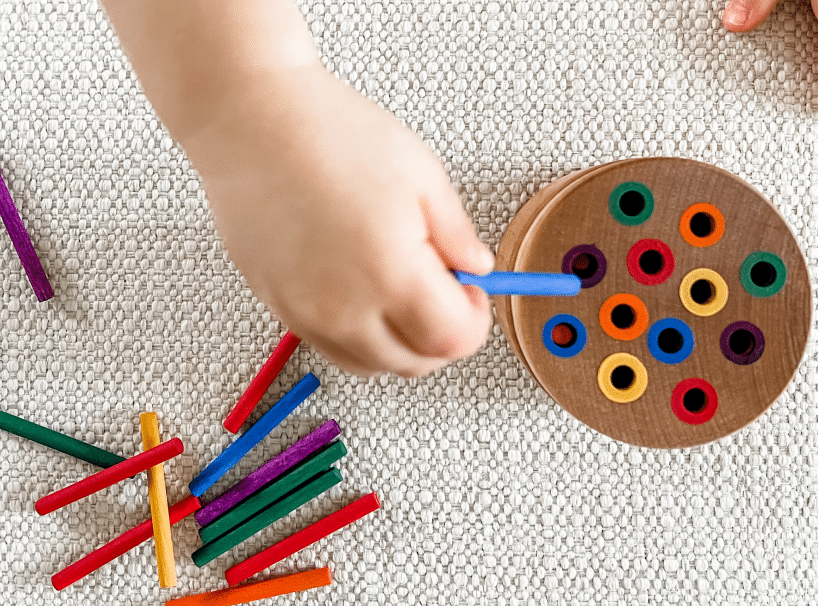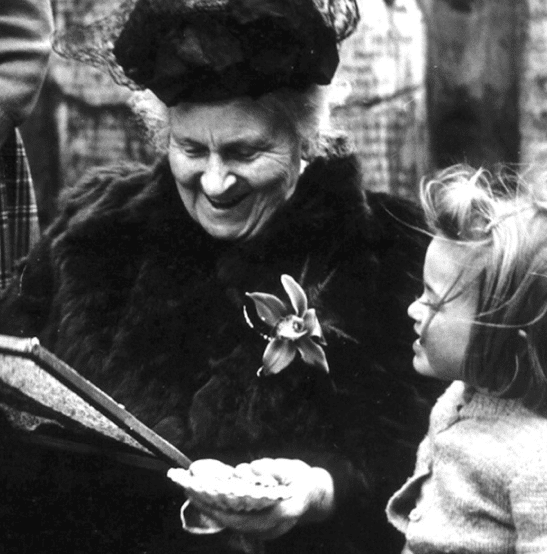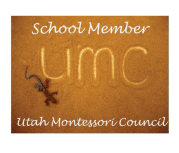

Curriculum

Primary School Curriculum
Our Early Childhood classroom provides an environment that is carefully prepared to meet the needs of three to six-year-old children. Our classrooms are equipped with engaging materials for the students to work with, in a beautiful and peaceful setting. Dr. Montessori observed that three to six-year-old children effortlessly absorb information and form impressions and habits that become the basis for all future learning and behavior. They achieve early mastery of concepts and skills in reading, writing and mathematics through their work with the Montessori materials.
Montessori Method
Elizabeth Academy embraces the child-centric Montessori Method, creating classroom communities that foster rigorous, self-motivated growth in cognitive, emotional, social, and physical development. Our student-led and self-paced approach is supported by accredited teachers, peer leadership, and a nurturing environment within multi-age-grouped classrooms, aligned with the scientific planes of childhood development. By promoting independence, citizenship, and accountability, Montessori education helps students become confident, enthusiastic, and self-directed learners who think critically, collaborate effectively, and act with integrity.
Cosmic Education
Cosmic Education provides a holistic framework that connects all subjects, helping students understand their place in the universe and the interconnections between different areas of knowledge. This approach fosters a sense of wonder and curiosity, encouraging students to explore big ideas and see the relevance of their learning to the broader world. By integrating Cosmic Education, we inspire students to develop a deep appreciation for the interconnectedness of life and their role in contributing to a greater whole.
Exploration
Movement and discovery are important elements in a Montessori education. Classrooms are designed to allow for freedom of movement and shelves are filled with inviting learning materials, intentionally designed to reinforce concepts and laid out in order of complexity, left to right, to reinforce reading. Self-correction is built into the materials to bolster confidence and self mastery. Clean, white walls and shelving are punctuated with bright materials that attract curious minds. Freedom of choice and movement means that “the hand informs the mind” and the joy is in the discovery.
Social Development
Multi-age-grouped classrooms (in 3-year cycles, based on the scientific planes of childhood development) ingeniously infuse a sense of belonging and the comfort of community into the classroom, instilling a sense of social identity and responsibility, as children encounter a year-long phase of being the youngest, middle, and then oldest in the classroom. Competition is replaced with cooperation, peer modeling, and mentorship, as leadership opportunities abound for each child in their social development.
Practical Life Skills
Practical Life is a cornerstone of our curriculum, focusing on essential skills such as self-care, environmental stewardship, grace, courtesy, and movement. These activities foster independence, responsibility, and respect for oneself, others, and the environment. By fully engaging in a Practical Life curriculum, students develop foundational skills that support their holistic growth and prepare them for lifelong tasks and learning that will lead to meaningful lives and contributions to the community.
Language & Communication
Montessori highlights the crucial role of language and humanities in fostering literacy and broadening students’ perspectives. We use best practices in the science of reading, beginning with phonetic exploration through sandpaper letters and progressing to blending with a moveable alphabet. Nomenclature is emphasized with word study, reading, writing, and vocabulary building. This approach develops linguistic proficiency and integrates real-world experiences to deepen students’ appreciation for language and its ability to open doors to diverse perspectives and opportunities.
Sensory Development
Our program emphasizes Sensorial activities to refine the five senses: touch, sight, smell, taste, and hearing. These materials and experiences are integral to our curriculum, helping children explore and understand their sensory perceptions meaningfully. By engaging in these multi-sensorial activities, students enhance their sensory awareness, critical thinking, and cognitive skills, benefiting from an inclusive approach that fosters a deeper connection to their learning environment.
Mathematics
Montessori’s math materials creatively and concretely instill math concepts with understanding reinforced by color coding, weights, measurements, and a spiral curriculum that utilizes some of the same materials for ever advancing concepts from early childhood through upper elementary. The Montessori math curriculum brilliantly builds a strong foundation by integrating practical life activities that strengthen the mathematical mind processes. Our highly individualized curriculum ensures that every student develops essential skills for academic success and a lifelong love of learning.
Cultural Studies
The Montessori cultural curriculum integrates diverse subjects like geography, history, art, and science (zoology, botany, and cosmic education) to help children understand their place in the world and develop cultural competence. It emphasizes exploration and discovery as key learning methods, making cultural education a vital part of daily instruction alongside language and math. This approach fosters a deeper appreciation for the world and supports a well-rounded perspective for students at every age level.
The Arts
In a Montessori school, integrating the arts—dance, music, visual art, and theater—within the classroom nurtures students’ creative spirit and encourages innovative problem-solving. This approach emphasizes using artistic expression to enrich learning experiences and foster personal growth. By intertwining the arts with academic subjects, students develop a holistic understanding of their world and approach life with creativity and confidence.
STEAM
In a STEAM program, integrating science, technology, engineering, art, and math within the classroom fosters students’ creative problem-solving and innovative thinking. This approach highlights the importance of using artistic expression to enhance and connect with technical subjects, enriching the learning experience. By blending these disciplines, students develop a comprehensive understanding of complex concepts and approach challenges with creativity and confidence.
Secondary School Curriculum
Language Arts
All instructional staff are skilled in language and literacy, underscoring the importance of communication and social engagement across subjects. Our curriculum emphasizes conceptual knowledge, skill building, and life skills. Each year, our instruction is guided by a thematic approach using “hub books” or community books—classic, grade-level texts aligned with the annual theme. This integration of literature ensures a cohesive and engaging learning experience that supports both academic and personal growth.
Social Studies
In our Humanities department, all instructional staff are skilled in language and literacy. Social studies classes are organized around three components: Conceptual Knowledge, Skill Building, and Application. These components aim to develop students’ comprehension, critical thinking, and communication skills. Each year, instruction is guided by “hub books” or community books—classic, grade-level texts aligned with the annual theme. These texts work in tandem with the social studies curriculum to enhance students’ understanding of historical and social contexts, ensuring a comprehensive and inclusive educational experience.
Mathematics
At Elizabeth Academy, our math instruction emphasizes individualized curriculum and skill building, with a focus on practical life skills and real-world application. The math curriculum thrives off of a balance of practical life skills, as well as continued academic growth. This approach ensures that students engage in tasks tailored to their needs, supporting their growth and understanding of math in everyday contexts. Students are grouped so that every individual is challenged and also prepared to advance beyond high school with the math skills and requirements needed for their individual post-secondary college and/or career experiences.
Sciences
Our Montessori-inspired science curriculum has proven itself to be outstanding, as our students consistently display high test scores in science, across ability levels, year after year. Creativity and critical thinking skills are expanded as the science program emphasizes community learning as well as individualized instruction. Students engage in hands-on, developmentally appropriate tasks and small group activities. This approach ensures that students experience practical, real-world applications of scientific concepts. Students acquire a deep understanding of scientific principles, develop a love of the process, and engage in activities that foster curiosity and discovery.

Montessori Education
At the secondary level, Elizabeth Academy builds upon a Montessori foundation taught from early childhood through elementary and continues with best practices in Montessori philosophy. The 100-year-old approach fosters rigorous, self-motivated growth for children and adolescents in all areas of development — cognitive, emotional, social, and physical.
This student-led and self-paced structure is guided, assessed, and enriched by accredited teachers, peer leadership, and a nurturing environment. Aligning with core standards to provide an accredited program for high school graduation, our curriculum is further enhanced with the Montessori ethics of hard work, vocational and life skills building, college and career readiness, service opportunities and the process of valorization.
Secondary students are multi-age-grouped into 2-year cohorts: 7th/8th (Middle School), 9th/10th, and 11th/12th (High School). We embrace multi-sensory learning and passionate inquiry. Individual students follow their own curiosity at their own pace, taking the time to fully understand each concept and meet individualized learning goals.
By encouraging independence, citizenship, and accountability, Montessori students grow up to be confident, enthusiastic, and self-directed learners and citizens, accountable to both themselves and their community. They think critically, work collaboratively, and act boldly and with integrity.


Enriching Education For Every Student
Elizabeth Academy follows Montessori inclusivity by serving typical and academically advanced students, as well as children who are neuro-diverse and/or have intellectual disabilities.
Montessori classrooms come alive with movement and sound. Montessori environments are beautiful, full of natural light, wooden beads and blocks (for the younger students), books of all kinds, and flowers in glass vases. In addition to core competencies, students learn visual arts, music, dance, theatre, film, peer mentoring, and leadership.
Elizabeth Academy students blend classroom learning with community education. They attend plays, visit museums, and participate in service projects, dual high school enrollment, after-school theatre programs, concurrent college enrollment, and vocational training.
Elizabeth Academy also offers private therapies and therapy integration, such as speech and language therapy (SLP), music therapy (MT), occupational therapy (OT), physical therapy (PT), reading therapy, and social/emotional/behavioral (SEB) programs.





